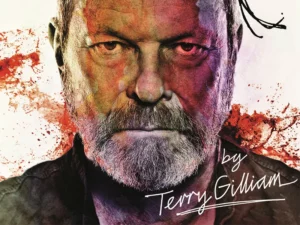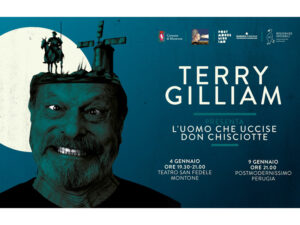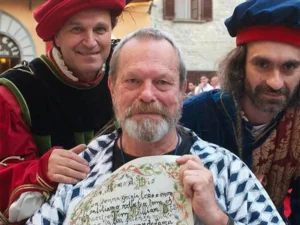Terry Gilliam

Terry Gilliam is an American-British filmmaker, screenwriter, comedian, illustrator, cartoonist, animator, writer, film producer and set designer boasting a very long career studded with works of extraordinary visual impact. His films consistently celebrate the power of imagination and challenge viewers to see the world from a different perspective.
From Monty Python to early achievements
Born near Minneapolis – Minnesota – in 1940, Gilliam moved to London in the 60’s, where he became a key member of the legendary Monty Python team with whom he shares the success of the innovative, then cult series, Monty Python’s Flying Circus, broadcast by the BBC from 1969 to 1974. Later, he co-directed together with Terry Jones Monty Python and the Holy Grail (1975) and contributed as set designer, actor, screenwriter and animator to Monty Python’s – Life of Brian (1979). In Monty Python’s – The meaning of life (1983), Gilliam directed the eccentric short film “The Crimson Permanent Assurance”. For their outstanding contribution to British cinema, the group of Monty Python received the BAFTA Award in 1988.
Gilliam debut’s as a solo director goes back to 1977 with Jabberwocky, followed by the success of Time Bandits (1981). 1985 saw the release of Brazil, acclaimed as Best Picture from Los Angeles Film Critics Association and nominated for two Oscars (Original Screenplay and Set Design). Brazil was followed by The Adventures of Baron Munchausen (1988), filmed in Rome with an extraordinary cast including John Neville, Robin Williams and Oliver Reed, receiving four Oscar nominations.
THT PERIOD IN THE USA
In the 1990s, Gilliam directed three films in the United States: The Fisher King (1991), winner of the Silver Lion (Leone d’Argento) at the Venice International Film Festival. In the dystopian masterpiece 12 Monkeys (1995) Gilliam directed Bruce Willis and Brad Pitt on an exciting journey through time. In 1998, Fear and Loathing in Las Vegas reached the big screen, based on the novel by Hunter S. Thompson, with the unforgettable performances of Johnny Depp and Benicio Del Toro.
FILM CHALLANGES AND INTERNATIONAL PROJECTS
In 1998 Gilliam embarked on what would become one of his greatest and most difficult film challenges: The Man Who Killed Don Quixote. Shooting began in Spain in 2000 but was suspended shortly after due to bad weather, injuries of actors and various unforeseen events. The troubled production story of the film making was told in the documentary Lost in La Mancha (2002) directed by Keith Fulton and Louis Pepe, two of Gilliam’s collaborators. With his Don Quixote on forced hiatus, Gilliam worked on some international projects: he directs The Brothers Grimm (2005) with Matt Damon and Heath Ledger, and the disturbing Tideland (2005), with Jodelle Ferland and Jeff Bridges. He co-wrote and also directed The Imaginarium of Doctor Parnassus (2009), with a cast including Heath Ledger, Johnny Depp, Colin Farrell, Jude Law, Christopher Plummer and Andrew Garfield. In 2009 he was awarded the BAFTA Fellowship for his career, one of the most important awards in the world of cinema.
In 2011, he wrote and directed The Wholly Family, which won Best Short Film at the European Film Academy. In May of the same year, he made his successful debut in opera directing, conducting Hector Berlioz’s La Damnation de Faust for the English National Opera in London. In 2011 he also received the Premio Fondazione Fellini.
Gilliam then returns to his peculiar sci-fi universe with The Zero Theorem, a 2013 film presented in competition at the Venice Film Festival, arrived in Italy, however, only three years later.
The exploration of theatre direction and live performance continues with the direction of Benvenuto Cellini (2014) and his participation as an actor in the series Monty Python Live (Mostly) (2014), which celebrates the legacy of the comedy group.
In 2018, after several attempts and 20 years of waiting, The Man Who Killed Don Quixote was finally released.
 TERRY’S VISION: UNLIMITED IMAGINATION
TERRY’S VISION: UNLIMITED IMAGINATION
His approach to cinema is deeply rooted in the belief in the power of imagination.
“In my movies I always try to suggest new ways of looking at the world. Maybe someone will decide to follow that direction and maybe find something even more interesting. Today, in the world we live in, there are so many Media pushing you and say: ‘This is the world. This is reality.’ I do not want that limit, I want people to use their imagination to create different worlds. That’s why Don Quixote is such an important character. His vision of reality is crazy, noble and wonderful. Reality tries to defeat him and crush him every time. And he gets up, every time. He’s one of the greatest heroes of literature and we should all learn from him.”
 THE BOND WITH THE MUNICIPALITY OF MONTONE AND THE UMBRIA FILM FESTIVAL
THE BOND WITH THE MUNICIPALITY OF MONTONE AND THE UMBRIA FILM FESTIVAL
The bond between Terry Gilliam and the village of Montone is profound and lasting: he received the Keys of the City of Montone in 1998, and became an Honorary Citizen in 2010.
The Umbria Film Festival Association counts him with great honour as its Honorary President and creator of its iconic logo: an illuminated revisitation of the famous portrait of Battista Sforza by Piero della Francesca.
THE FUTURE: ” CARNIVAL AT THE END OF DAYS”
Currently, Terry Gilliam is working on his next highly awaited film, Carnival At The End Of Days, a four-handed script written together with Christopher Brett Bailey. Filming is set to begin in 2025, with a cast that should include big names in cinema such as Johnny Depp, Jeff Bridges and Adam Driver.
“God decides to destroy humanity for having ruined his beautiful garden – the Earth -. A single person somehow tries to save humankind, Satan: he needs their souls, otherwise he would lose his job. So he find two young people, a boy and a girl, thinking that they could become the new Adam and Eve…”



